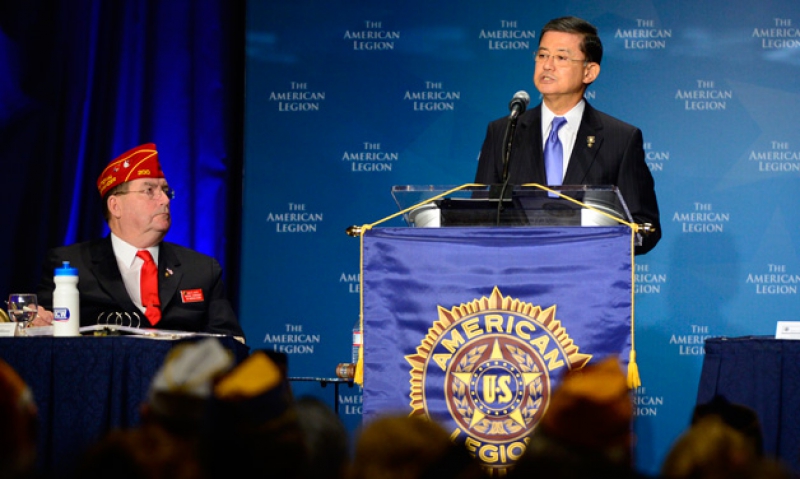
VA secretary wants Legion to encourage student veterans nationwide to graduate.
Department of Veterans Affairs Secretary Eric Shinseki told Legionnaires on Feb. 26 at their annual Washington Conference that veterans “stand ready to help rebuild the middle class and return every dollar invested in them by strengthening America. They’ve done it before, they will do it again.”
Shinseki challenged American Legion posts to communicate with local student veterans, and reinforce the importance of graduating from their colleges, universities and training programs. “The American Legion can be very helpful to us here, because all across the country where these youngsters are in school … the country needs them to do well, so encouragement to them would be helpfu," he said.
Since 2009, VA has provided more than $25 billion in GI Bill education benefits to veterans, servicemembers, family members and survivors. VA is also working with the Student Veterans of America to track graduation rates of student veterans. Addressing those men and women who have served in uniform, Shinseki said, “There is no payoff to you, no payoff to the program, no payoff to the country if you don’t graduate.”
The 1.4 million veterans who are mortgage-holders with VA guaranty loans have felt the effects of economic downturn, and about 80,000 defaulted on their payments. Yet VA was able to keep about 70,000 of them in their homes with renegotiated payment plans and other financial strategies.
“While we feel good about that,” Shinseki said, “my challenge to ourselves is, ‘What happened on the other 10,000 or so? How do we prevent that from happening next year?’ We all have a hand in helping these folks … from being homeless.”
Veterans homelessness has gone down by 17 percent since 2009, with an estimated 62,600 veterans remaining on America’s streets. Shinseki said that winning such a battle requires both rescue and prevention: “Rescue those who are on the streets today, and prevent those at-risk of homelessness from starting into that downward spiral," he said.
VA is working with about 150 nonprofit organizations nationwide as part of its strategy to prevent veterans from becoming homeless.
Over the past four years, VA’s budget has increased from $99.8 billion to $140 billion (roughly 40 percent). As its budget has increased, so has access: more than 800,000 veterans have been added to VA health care since 2009.
This year, VA is investing about $335 million in virtual access technologies to connect veterans to the VA health-care system, regardless of where they live. Such funding will link VA’s 152 medical centers and 104 affiliated medical schools to their 821 Community-Based Outreach Clinics and 300 Veterans Centers with mobile clinics.
Shinseki said that access “is also about processing (disability) claims. We intend to process claims in less than 125 days at 98 percent accuracy, and to end this thing called the backlog that has built up over decades. We’re not there yet, as all of us know, even though we’re processing a million claims each year.”
In fact, VA has processed 4.1 million claims since 2009; yet in the same time period, another 4.6 million new claims were filed – paper claims. “We need to get out of paper,” Shinseki said, and noted that the new electronic Veterans Benefits Management System (VBMS) is being used at 20 regional offices of the Veterans Benefits Administration (VBA), and will be operational in all 56 of its offices by year’s end.
The VBMS was demonstrated to representatives from the Legion and other veterans service organizations last week at the VBA’s regional office in Atlanta. “I’m told that all were impressed with its functionality,” Shinseki said. “So my message to you is VBMS is here, it works, we’re on track to eliminating this backlog by 2015.”
The number of veterans seeking mental health care has increased substantially in recent years, but Shinseki said his department would meet the president’s June 30 deadline for increasing VA’s mental health providers by 1,600. An additional 800 peer-to-peer mental health specialists are also being hired, “veterans who have wrestled with mental health issues themselves and succeeded," Shinseki said.
The Veterans Crisis Line, Shinseki reported, has answered more than 725,000 calls from veterans in need since its inception in 2007, along with 80,000 chats and 5,000 texts. Because of VA’s intervention, 25,000 men and women have been rescued from suicides in progress – the equivalent of two Army divisions.
The VA secretary thanked The American Legion for what it does “day in and day out for America’s veterans. At the core, the Legion’s mission is about upholding America’s highest ideals and providing unwavering support to your fellow veterans. The Legion’s good works … have been crucial to the lives of millions of our fellow citizens all across this country.”
- Washington Conference

